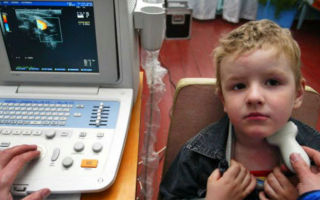Content
Iodine is considered one of the main trace elements. A sufficient amount of it ensures the full functioning of the thyroid gland. He plays a special role in the lives of children. Lack or excess of iodine adversely affects the development of the body. Various malfunctions of the nervous, cardiovascular and immune systems occur. You can avoid complications if you start taking special medications in a timely manner. But iodine for children is recommended only by a doctor, based on individual characteristics, indications and age.
The role of iodine in the child's body
Iodine is one of the important elements of the human body. This component is responsible for the functioning of the thyroid gland and the level of hormones. He is directly involved in metabolic processes.
Iodine is essential for both adults and children. It has no nutritional value, but plays one of the main roles - it takes part in the synthesis of thyroid hormones. Thanks to this, iodine becomes of great importance for the body both during intrauterine development and after the birth of a child.
Iodine takes part in the formation of the nervous system. If there is a shortage of it, then the baby will begin to lag behind in development. This component enters the body through food or water. The source of iodine is iodized salt, cherries, apricots, milk, lettuce, beets, and seaweed. But before the age of 2-3 years, children are forbidden to eat most of the listed products, against the background of which iodine deficiency occurs.
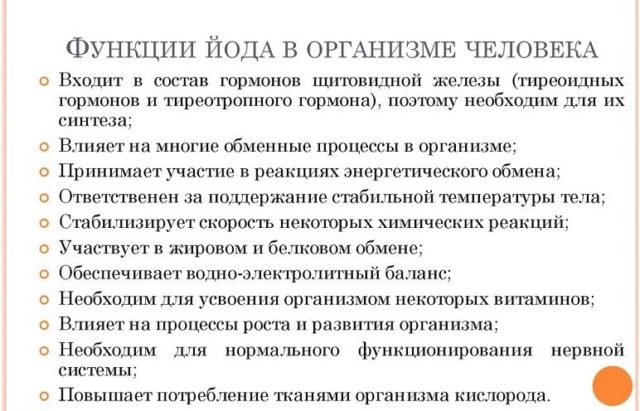
Daily requirement for iodine in children
In Russia, almost everyone suffers from iodine deficiency. This is due to the fact that there is a lack of the very trace element in the environment - in water, soil, air and food.
The daily intake of iodine in an adult living in Russia is 40-80 mcg. At the same time, the need for it reaches 150 mcg per day.
In childhood, these values are slightly lower:
- infants up to 2 years old - 50 mcg;
- children from 2 to 6 years old - 90 mcg;
- children from 7 to 12 years old - 120 mcg;
- adolescents - 140 mcg.
Causes of iodine deficiency
Experts identify several main reasons for the lack of iodine in the body:
- poor nutrition and restriction in the consumption of certain products in the form of shrimp, fish, seaweed and buckwheat;
- poor absorption of trace elements as a result of malfunctions in the digestive tract;
- living in an area where iodine is not enough;
- hereditary predisposition;
- poor appetite or lack of it.
The main cause of iodine deficiency in children is considered to be a lack of a trace element at the stage of gestation and breastfeeding. This can lead to congenital anomalies and malformations of internal organs, stunting and neuropsychic development.
Symptoms of a lack of iodine in the body in children
Iodine deficiency can be congenital or acquired. In the first case, 2 diseases are diagnosed - hypothyroidism and cretinism.
Hypothyroidism is manifested by:
- the birth of a large child with signs of immaturity;
- prolonged jaundice during the neonatal period;
- late falling off of the umbilical cord;
- decreased physical activity in the first year of life;
- late teething and closure of the large fontanelle;
- a weakened reaction to surrounding events;
- hoarse and rough voice;
- decreased muscle tone in the limbs;
- lagging behind in physical and emotional development.
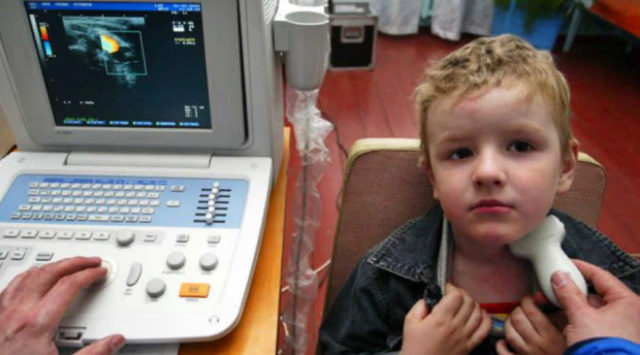
Cretinism in children is accompanied by:
- stunted growth;
- delayed speech development;
- violation of coordination of movements;
- improper skeletal structure;
- the presence of a short neck, large abdomen with signs of an umbilical hernia;
- chronic constipation;
- the development of hearing loss;
- swelling of the lacrimal gland;
- anemia;
- low blood pressure and bradycardia;
- the appearance of senile folds on the frontal part.
In such children, eyes are usually wide apart, there is difficulty breathing through the nose, the mouth is always open. Excessive salivation is diagnosed.
If iodine deficiency occurs during a period of active growth, then this process will manifest itself:
- chronic fatigue;
- drowsiness;
- swelling of the face, hands and feet for unknown reasons;
- dull and brittle hair;
- thickening, flaking and dry skin;
- apathy and lethargy.
The child begins to show low activity, interest in the environment is lost. School-age children are lagging behind in their studies, and preschool children are often sick.
Iodine preparations for children
Lack of iodine not only badly affects the thyroid gland, but also the functionality of other internal organs. Serious problems can be avoided. To do this, you need to include in the diet more of those foods that include this trace element. But not every child will agree to eat seaweed and buckwheat every day. Walnuts can cause allergies, and salt for babies is considered one of the harmful products, because it leads to the accumulation of fluid in the body and the appearance of edema. In such cases, taking special medications will help.
Iodomarin for children
The medication is available in tablets. Manufacturer - Germany. Children are given the drug with a dosage of 100 mcg. It is prescribed for the prevention of endemic goiter, for the treatment of euthyroid and diffuse conditions.
Children under 12 years of age are prescribed 1 / 2-1 tablet per day. Teens are shown 2 pieces. in a day. It is better to take the medicine after a meal with plenty of water. For young children, the product is pre-dissolved in water, milk or fruit juice. You can take pills for several years with a break of 1-2 months.
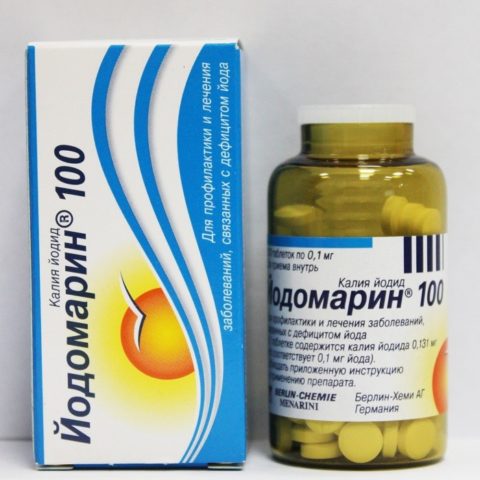
Iodonormin
Structural analogue Yodomarina, only produced by a domestic pharmaceutical company. Has two dosages - 100 and 200 mcg.
Babies under 6 years old are given 1/4 tablet. Children of school age are recommended to take 1/2 tablet. Teenagers are prescribed 1 pc. per day. It is better to take the medicine in the morning after breakfast. For prevention, it is recommended to drink the course for 2-3 months, then take a break for 30-60 days.
Patients tolerate the drug well. Adverse reactions are extremely rare.

Iod-Active for children
Domestic drug. Has a low cost. Available in tablets. The composition of 1 tablet contains:
- skimmed milk powder;
- lactose monohydrate;
- iodcasein (consists of one aqueous calcium stearate and iodine).
The drug is well absorbed by the body. With an excess amount, the trace element is promptly excreted without getting into the thyroid gland. This effect is observed due to the fact that the medicine consists of milk protein. Under the influence of liver enzymes, it breaks down.Normalizes metabolic processes.
Well tolerated by patients. But it is not prescribed for children who have been diagnosed with lactose deficiency or allergy to cow protein.
The tablets must be taken with meals. Children under 14 years of age are prescribed 1 tablet per day. Teenagers are advised to drink 2 tablets a day.
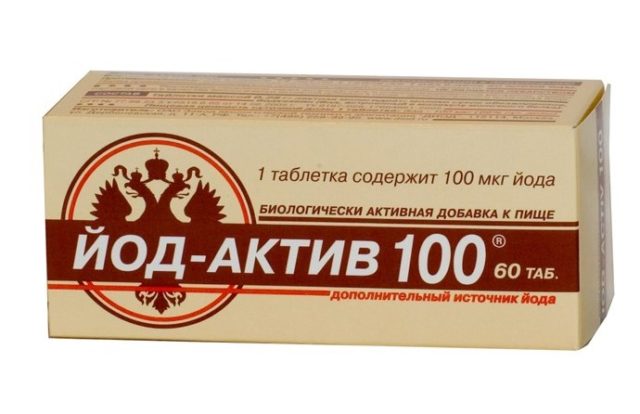
Potassium iodide
An inexpensive drug produced in Russia. Available in tablets, drops and solution. Has 2 dosages - 100 and 200 mcg. It is widely used in medicine for the treatment of endemic goiter, thyrotoxicosis, hypothyroidism.
It is used for diseases of the respiratory tract of an inflammatory nature and bronchial asthma. Helps with eye diseases.
But it has a large list of contraindications in the form:
- tuberculosis;
- nephritis or nephrosis;
- furunculosis, acne;
- purulent inflammatory processes on the skin;
- urticaria and hemorrhagic diathesis.
Potassium iodide is taken orally during meals. To avoid irritation of the mucous membrane of the digestive tract, it is necessary to drink the pills with sweetened tea, milk or jelly.
Babies and babies under 3 years old are given the drug in the form of drops. The dosage is 2-4 drops per day. Children under 12 years old are shown 1/2 tablet. Teenagers are prescribed 1 tablet a day.
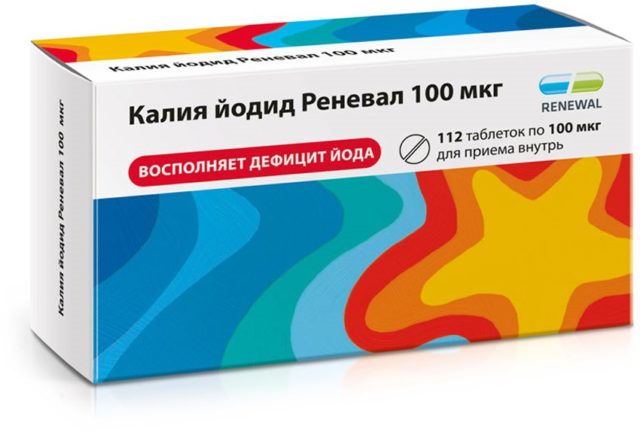
Doppelherz asset Iodine + Iron
Fortified complex, which includes:
- iodine;
- folic acid;
- vitamin B12;
- iron.
Not recommended for children under 14 years of age. To replenish iodine in the body, adolescents need to take 1 capsule per day.
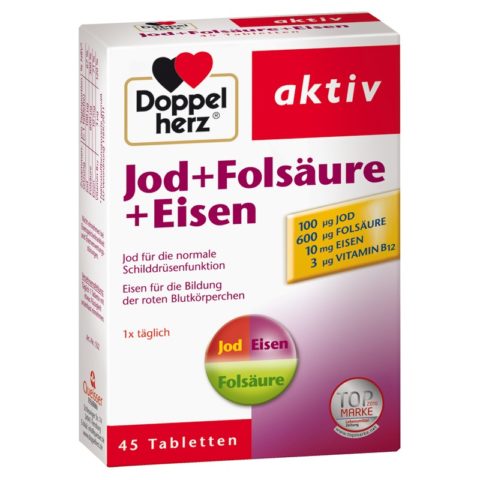
Children's vitamins high in iodine
Iodine deficiency is considered one of the serious problems of modern society. Children are increasingly suffering from micronutrient deficiencies. This adversely affects the general condition, physical and mental abilities. It is difficult to get a child to eat healthy foods. But, in order to prevent the development of serious problems, it is recommended to give children vitamin and mineral complexes. They have a safe composition and are designed for a certain age.
Alphabet Classic
Supplements are produced in the form of tablets of 3 colors. Each tablet contains trace elements that are well combined with each other.
White pill consists of:
- vitamin D3;
- calcium pantothenate;
- folic acid;
- vitamin B12;
- vitamin H;
- vitamin K1;
- chromium;
- calcium.
You need to drink white pills in the morning.
Blue pill includes:
- retinol;
- alpha-tocopherol;
- ascorbic acid;
- vitamin B2;
- vitamin PP;
- magnesium;
- manganese;
- selenium;
- molybdenum;
- iodine;
- zinc.
Dragee is taken at lunch.
Pink pill consists of:
- vitamin D3;
- pantothenic acid;
- folic acid;
- nicotinic acid;
- chromium;
- calcium.
Take blue pills in the evening during dinner.
The complex is designed for children over 7 years old and adolescents.
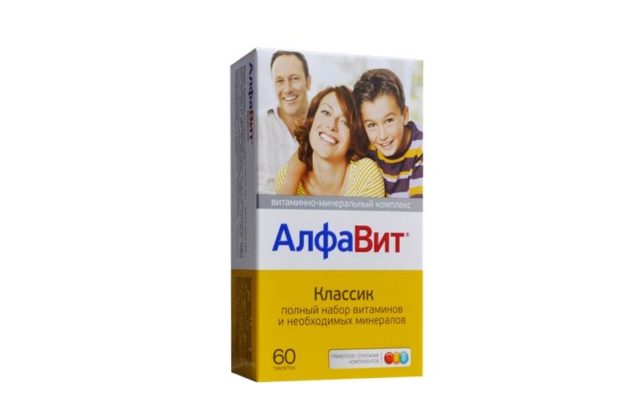
Vitrum
Yod Vitrum is specially developed for children. Available in chewable tablets. The main active ingredients are iodine and calcium. It is indicated for the prevention of mental disorders, disorders in the functionality of the thyroid gland, increasing physical endurance, reducing the risk of goiter.
Children are given 1 tablet a day. The prophylaxis lasts for 1 month. The course is repeated 2-3 times a year.

Complivit Multivitamins + Iodine
A drug that contains vitamins and minerals, including iodine. Produced in powder, which is intended for the preparation of a suspension. Has a pleasant banana flavor. The complex is intended for children aged 3-14 years. Improves mental development, strengthens the immune system.

Perfectil
Vitamin and mineral complex for adolescents and adults. It has antioxidant, regenerating and dermatoprotective effects. Contraindicated in children under 14 years of age. It has a positive effect on the state of cells and blood microcirculation.
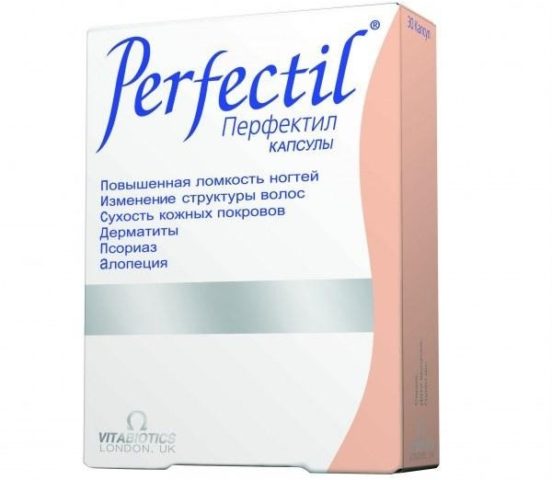
Multi-tabs Classic
It contains vitamins and minerals. Manufacturer - Denmark. Eliminates the deficiency of retinol, vitamin D3, group B, ascorbic acid, iodine, magnesium, iron and zinc. A universal drug that must be used to prevent deficiency of important trace elements, normalize metabolic processes, after illness.
Contraindicated in children under 11 years of age. It is recommended to take dietary supplements once a day.
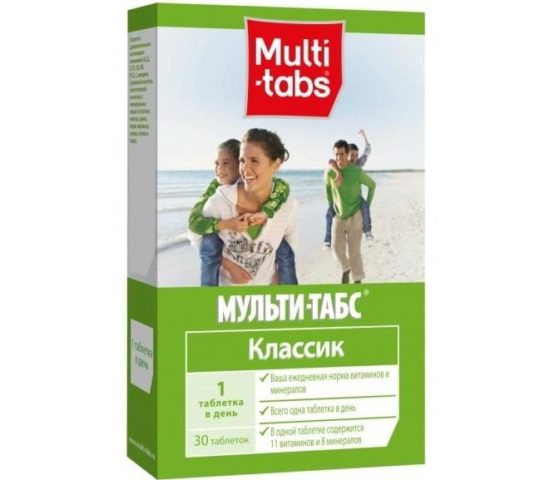
Contraindications for use
Preparations with iodine should not be drunk with increased susceptibility to the components of the medication. Forbidden with the development of hyperthyroidism.
Conclusion
Iodine for children is one of the important ingredients. Without it, the thyroid gland cannot function normally. You can get this trace element from food and water. But children don't always agree to eat such food. Therefore, periodically it is necessary to carry out prophylaxis, which involves taking iodine-containing drugs.

